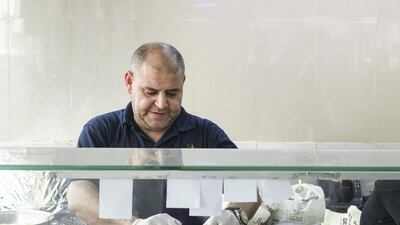On the first day of Eid, Hassan Qasmieh is as busy as he has been during the entire month of Ramadan.
In his family restaurant in Khalidiya, Abu Dhabi, his station is right by the door, surrounded by a vat of olive oil from Palestine, two kinds of spicy pickled chilli peppers, and four jumbo stockpots of whole and pureed beans.
His authoritative shouts for orders of falafel from across the room are only ever interrupted by either warm greetings for incoming patrons or a sweet word to appease a customer who thinks they’ve waited too long.
He somehow manages to do this all while mixing the ingredients encircling him to make one of the 12 varieties of hummus and foul available at Qasmieh Al Fawwal.
It’s a remarkable skill made up of equal parts culinary virtuosity and off-the-cuff diplomacy but, then again, it's all the 47-year-old Jordanian-Palestinian man has ever done.
“Ever since I can remember, my first memories of Eid, we were working at my grandfather’s restaurant, which was passed onto my father, then onto me and will be inherited by my son,” he said.
Hassan has been making his grandfather’s recipes ever since he could stand. He has served, in his estimation, millions if not tens of millions of falafel over four decades in the restaurant.
“I think people want a taste of the Levant here, and they know when they come to my restaurant they’re getting a real taste of home, so I am always happy to greet my customers on Eid and bring them that joy,” he said.
Eid breakfast is an important meal for fasters. Cravings that have been mounting for entire month are expected to be satisfied, and traditional dishes on one of the most important Islamic Holidays bring a taste of home for many living abroad.

Down the street, the kitchen in the Fujairah Restaurant is surging with activity, hands are rushing to prepare feasts for incoming diners. Kabuli pulau, kebab and mutton curries are in high demand and Abdullah Sabir, the manager from Peshawar, is handling two phones trying to deliver.
“This is how I remember Eid, running around playing cricket, lots of activity, wrestling and then running back home to eat biryani and kebab,” he said. “It’s important to get a taste of that food for many Pakistanis living here and they come to eat”.
Mr Sabir brings his Peshawari biryani and Kabab to the UAE’s second biggest expatriate community. Although he tries, he admits he will never get the same flavor delivered by his mother
“I know I will never get close, the home taste is different but we will try, God willing,” he said stroking his henna-dyed beard.
But it’s precisely these secret recipes and ancient dishes passed down for generations as treasured family heirlooms that those with voracious appetites seek out on the first day of Eid.
Saeed Al Jabri, Emirati owner of Yemeni restaurant Besbas, is busy running restaurants that are delivering classic Yemeni dishes, the origins of all Arabian Gulf cuisine, to households around the UAE.
His employees, a mix of Yemenis, Moroccans and Iraqis, are busy loading up adult wingspan-wide plates of steaming hot Madhbi, a dish of rice topped with lamb cooked on searing hot stones.
“That’s our house on Eid, that’s the smell and that was the reason behind the restaurant to bring that taste.”
He says everything on the menu is cooked in his two kitchens with the exception of besbas, the namesake dish of spicy pickled peppers that his mother hand makes at home to this day.
“At the end of the day, that’s what we want, to extend our table to all our customers and all the people living in the UAE, so you always feel at home,” he said.

